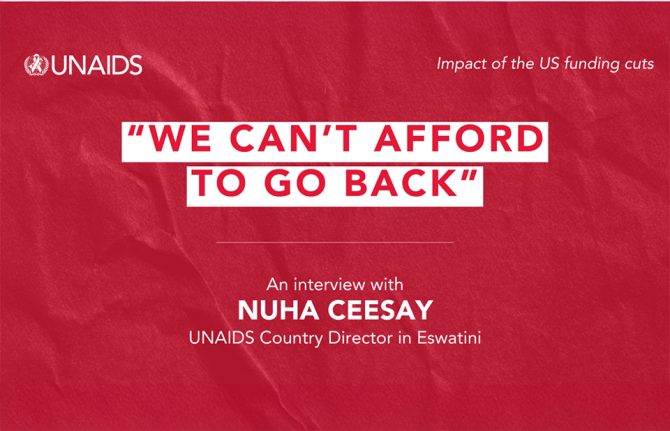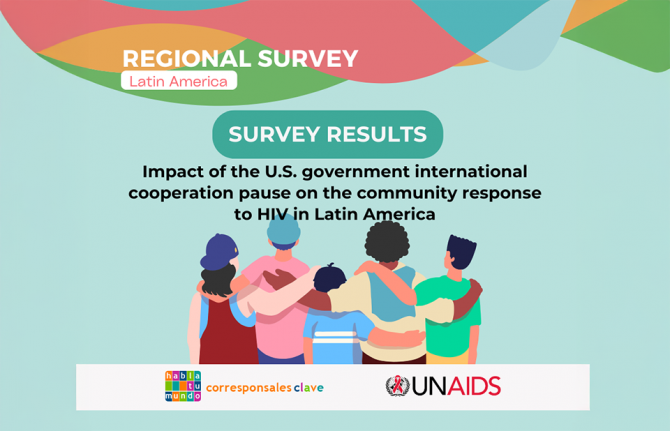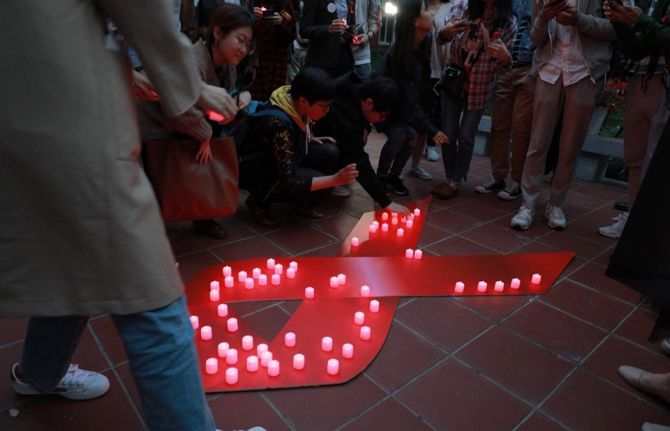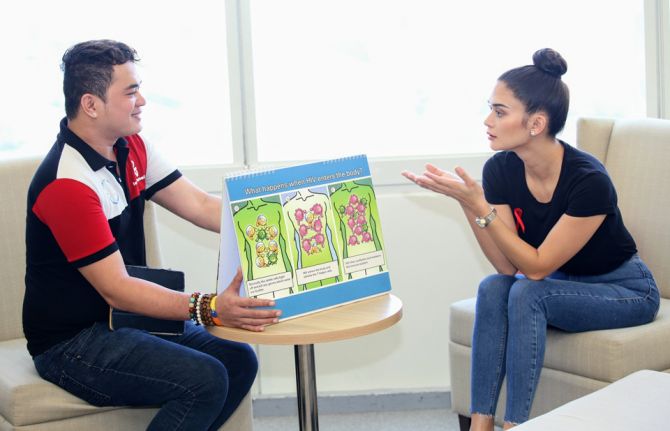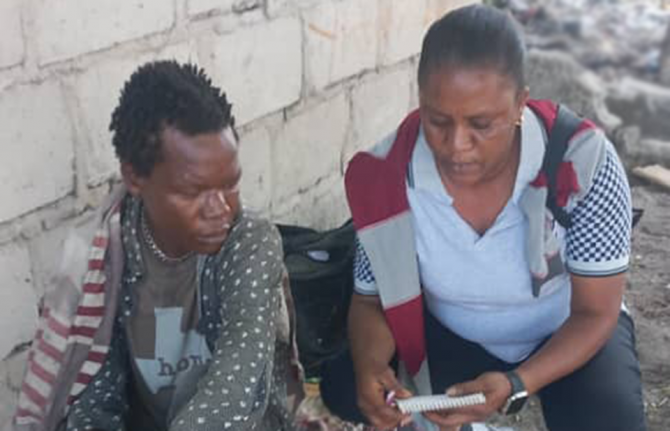
Feature Story
Swaziland: community involvement key
01 May 2007
01 May 2007 01 May 2007The involvement and participation of communities in providing care and support to people living with HIV and orphans in Swaziland has been heralded as a prime example of ‘best practice’ within the AIDS response that should be further developed across the country.

Mr Thembo Absalom Dlamini, The Right
Honerable Prime Minister of the Kingdom
of Swaziland
At a meeting with the Prime Minister of the Kingdom of Swaziland, Mr Themba Absalom Dlamini, UNAIDS Executive Director Peter Piot applauded the excellent examples in Swaziland where decentralization of the AIDS response using local community structures has helped reach the people most in need and at risk. He encouraged Swaziland to build on these experiences to ensure future successes.
According to latest estimates, Swaziland now has the highest adult HIV prevalence in the world – 33.4%.
“Swaziland is a country facing extreme challenges, with high HIV prevalence levels—but the country has shown that by decentralizing the response, more people can be reached and engaged, with the community becoming a central force of the response,” said Dr Piot.
Commending the Prime Minister on his leadership of the national AIDS response and spearheading the National Action Plan on AIDS, Dr Piot encouraged continued leadership and action, particularly in the area of scaling up HIV prevention to halt new infections in the country. Dr Piot underlined that “the whole nation” should be engaged in a sustained social movement to intensify HIV prevention, addressing the drivers of the epidemic in Swaziland and moving towards the country’s targets for universal access to HIV prevention, treatment, care and support.
Links:
Read feature story - Best Practice in Swaziland: Revival of old traditions brings hope to orphans

Feature Story
E-forum gets HIV prevention online
30 April 2007
30 April 2007 30 April 2007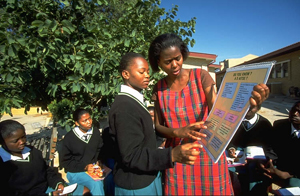
There is a need to intensify HIV prevention to halt growing
infection rates and sustain the gains that have already been
made in the AIDS response. Photo credit: UNAIDS/G.Pirozzi
Although a small number of countries around the world have seen HIV prevalence decline due to sound HIV prevention efforts, in 2006, there were still 4.3 million new HIV infections with over 40% of new adult infections occurring among young people aged 15-24.
These figures underline a clear and urgent need to intensify HIV prevention to halt growing infection rates and sustain the gains that have already been made in the AIDS response if the commitment to achieve universal access to HIV prevention, treatment, care and support by 2010 is to be met
As part of the ongoing efforts to identify effective HIV prevention interventions, UNAIDS in collaboration with the Southern Africa HIV and AIDS Information Dissemination Service (SAfAIDS) and the Health and Development Networks (HDN) is launching a new regional electronic discussion forum entitled “Accelerating Prevention”.
The electronic discussion forum (e-forum) aims to create a platform for people in eastern and southern Africa to share knowledge, experiences and skills in prevention, as well as to promote advocacy, partnerships and networking at both national and sub-regional level.
“For SAfAIDS, the ‘Accelerating Prevention’ e-forum will provide an opportunity and a platform for civil society to express their concerns, thoughts and experiences about HIV prevention. It is important for all to lend their voice to the debate and make a difference,” said Lois Chingandu, Executive Director, SAfAIDS
“Accelerating Prevention” is a time-limited e-forum that will run for a period of six months, starting on Monday 30 April until October 2007. During this period, six main topics related to prevention will be discussed, one each month, supported by position papers written by experts in HIV prevention issues which will serve as starting points for the electronic discussion. The six main topics for discussion will be:
1. Key drivers of the epidemic
2. Role of men in HIV prevention (including the issue of male circumcision)
3. Prevention for young people
4. Role of ‘classical’ sexually transmitted infections (STI) treatment in HIV prevention
5. Prevention from the perspective of people living with HIV
6. Strategic condom programming
Each topic will be broken down into key questions to guide the discussions. Research and resources will be collected in a database to support and supplement the discussion while key resource people will be identified for each topic.
By targeting stakeholders in eastern and southern Africa, the “Accelerating Prevention” e-forum discusses pertinent HIV prevention issues that will inform programme design and implementation across the region. Recognizing that there is no ‘one’ solution to bringing down rates of HIV infection, and that prevention programming needs will differ from country to country, and within a country itself, the forum emphasizes strategic information that can be used to guide programming to reach people most at risk and most in need.
“This e-forum provides a virtual space for the region to critically analyse the risk factors and drivers of the epidemic. It is hoped that the discussions will provide innovative and concrete suggestions of ways in which our HIV prevention interventions can be strengthened so that we can begin to reduce the number of new HIV infections in the future,” said Mark Stirling, Director of the UNAIDS Regional Support Team, East and Southern Africa.
Links:
Get online! To participate in the discussion please click here
Visit SAfAIDS website
Visit UNAIDS East and Southern Africa Regional Website
Read more on East and Southern Africa
Download UNAIDS’ Practical guidelines for intensifying HIV prevention: Towards Universal Access (pdf, 3.8 Mb)
Related

Feature Story
The UN: Delivering as One
30 April 2007
30 April 2007 30 April 2007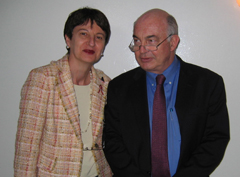
UNAIDS’ Deputy Executive Director Debbie Landey
with Kemal Dervis, Administrator of UNDP, at the
meeting in Brazzaville.
UNAIDS’ Deputy Executive Director Debbie Landey was in Brazzaville recently to attend a meeting on ‘ Africa’s agenda in a reforming United Nations system’. The meeting, convened by the United Nations Development Programme (UNDP), was held to discuss progress on ‘Delivering as One’ and to take UN Reform forward at country level. Participants included all of the UN Resident Coordinators from sub-Saharan Africa, Dr Asha-Rose Migiro, United Nations Deputy Secretary-General, Kemal Dervis, Administrator of UNDP and Gilbert Houngbo, UNDP’s Regional Director for Africa.
Ms Landey chaired a panel discussion on country expectations for increased effectiveness with high level representatives from pilot countries who volunteered for the ‘Delivering as One’ pilot initiative. Representatives included; Ms Monique Nsanzabanganwa, Minister of State in charge of Economic Planning of Rwanda; Antonio Lima, Conseiller spécial du Président du Cap Vert; Enrique Banze, Vice-Minister of Foreign Affairs, Mozambique; Mrs Joyce Mapunjo, Deputy Permanent Secretary in the Ministry of Planning, Economy and Empowerment and Chair of the Technical Committee of the 'One UN' initiative in Tanzania; and Jim Drummond, Director, UN Humanitarian, Conflict and Security Affairs, DFID.
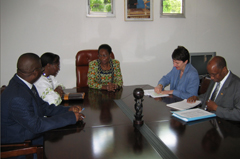
During her visit, Ms. Landey met with the Minister of
Health, Family and Social Affairs of the Republic of
Congo-Brazzaville, Emilienne Raoul
Together with participants, the high level representatives of the pilot countries reviewed the very high expectations they have from UN increased effectiveness in their countries.
Ms Landey also participated in a panel on challenges and opportunities for the UN system on ‘Delivering as One’.
Ms Landey shared the experience of UNAIDS by outlining it’s efforts to reinforce national leadership and structures; the principles of the ‘Three Ones’, bringing policy coherence to the response, reforming the architecture of the international response through the work of the Global Task Team, and bringing operational coherence on the ground through joint programming, joint teams, and the division of labour.
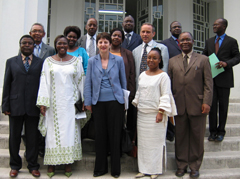
UNAIDS’ Deputy Executive Director Debbie Landey
met with the UN Country Team to discuss the national
response to AIDS.
“The experience of UNAIDS has much to offer to the ongoing broader efforts to bring greater coherence to the work of the UN system in support of country lead development goals and objectives,” said Ms Landey.
During her visit, Ms. Landey also met with the Minister of Health, Family and Social Affairs of the Republic of Congo-Brazzaville, Emilienne Raoul as well as with the UN Country Team to discuss the national response to AIDS, including the efforts of the government to put in place enhanced coordination mechanisms, update the data on the epidemic and set targets for universal access to HIV prevention, treatment, care and support .
Links:
Read the Report of the Secretary-General’s High Level Panel on System-Wide Coherence
More on UNAIDS: the ‘Three Ones’
Visit United Nations Development Group Website
Visit United Nations Development Programme Website
Related
 Impact of the pause of US foreign assistance in Côte d'Ivoire
Impact of the pause of US foreign assistance in Côte d'Ivoire

19 February 2025

Feature Story
FORO 2007 closes in Buenos Aires
27 April 2007
27 April 2007 27 April 2007
More than 4,000 people participated in the four-day
forum that came to a close on 20 April 2007 in
Buenos Aires.
The IV Latin American and Caribbean Forum on HIV/AIDS and STD’s came to a close on 20 April 2007 in Buenos Aires. More than 4,000 people participated in the four-day forum where people living with HIV, civil society groups, non-governmental and governmental institutions, academia, media and UN agency representatives came together to share ideas and discuss challenges and opportunities in the response to AIDS and sexually transmitted diseases in the region.
“This forum has been instrumental in increasing the visibility of the AIDS epidemic in the region,” said Dr. Cesar A. Nunez, UNAIDS Regional Director for Latin America.
Dr. Karen Sealey UNAIDS Regional Director for Caribbean added, “During this forum Governments, civil society and strategic partners have been called upon to continue unifying efforts and resources in the response to HIV in the region.”
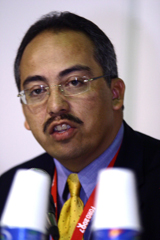
Dr. Cesar Nunez, UNAIDS Regional
Director for Latin America
highlighted the role of the forum in
increasing the visibility of the AIDS
epidemic in the region.
The International Centre for Technical Cooperation on HIV/AIDS (ICTC) a joint Brazil/UNAIDS initiative played a key role in organizing satellite sessions and side meetings focusing on commitment to providing technical assistance to countries and civil society groups in the region. The event also provided the setting for a meeting of the Coalition of First Ladies and Leader Women on AIDS.
Argentina ’s Minister of Health, Dr. Ginés González García and Dr. Mirta Roses, Director of the Pan American Health Organization underlined their commitment to overcome the challenges in the response to AIDS during their speeches at the closing ceremony.
“ Argentina will continue working with the countries of the region in finding the best prices for the drugs needed in order to improve access to treatment,” said Dr. González García. “Only these actions will help achieve the goals we have for the upcoming years,” he added.
Dr. Roses, speaking on behalf of the United Nations agencies said, “HIV has to be taken to the highest point in the political agenda, if not, our response will be too late. Poverty and social inequities relating to gender and ethnic groups need to be addressed as issues that are fuelling the AIDS epidemic in our region.”
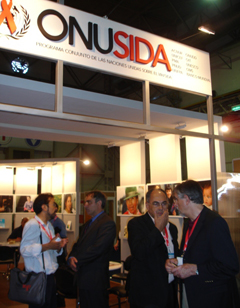
The forum has been an excellent platform
to share ideas and discuss challenges in
the response to AIDS in the region.
One of the important considerations at the forum was the discussion around the topical issue of male circumcision as an additional HIV prevention tool. Participants were united in recommending that male circumcision should not be seen as a stand alone prevention method and that it should only be considered and recommended as part of a comprehensive prevention package which should include correct and consistent use of condoms and a reduction in the number of sexual partners.
The forum is a bi annual initiative of the Horizontal Group of Technical Cooperation. It´s organising committee includes representatives of the regional civil society networks: ICW LATINA, REDTRASEX, ASICAL, REDLA+, MLCM+, REDLARD, LACASSO, REDLACTRANS.
The main outcomes included;
- Strengthening HIV prevention and promoting sexual health
- Ensuring that human rights for children and young people are integrated into the HIV response in the region
- Increasing HIV prevention programmes for people at higher risk of HIV infection including; men who have sex with men, sex workers, transpopulations, prisoners and people who inject drugs
- Generating public policies that guarantee gender identity and the reduction of stigma, as well as policies on human rights vulnerabilities such as poverty, ethnic groups and gender
- Strengthening the inclusion and participation of women in the response to the epidemic
- Promoting the monitoring and evaluation of access to treatment
- Reinforcing epidemiological surveillance and including civil society in the processes
- Setting targets towards the 2010 goal of universal access
- Ensuring adequate strategic planning, the will to ensure the mobilization of funds for implementation and successful monitoring and evaluation in countries
During the closing session, Andrés Leibovich, President of Foro 2007, made a symbolic transfer of the forum’s organising committee to representatives from Peru, who will be hosting the V Latin American and Caribbean Forum in 2009. The Peruvian delegation was headed by Dr. José Luis Mesones, Peru’s National Aids Coordinator.

Feature Story
Supporting people living with HIV in China
26 April 2007
26 April 2007 26 April 2007China is a country of expanding wealth, deep-rooted tradition, and honour, and is home to some of the world’s most famous landmarks. It is also a country which over the past few years has become increasingly affected by the AIDS epidemic.
In 2005 UNAIDS estimated that there were close to 650,000 people living with HIV in China, a country which has many factors that could lead to a rapid spread of the epidemic; high mobility, large-scale labour migration, high numbers of sex workers, low condom use, a large number of people who inject drugs, low overall awareness of AIDS as well as severe stigma and discrimination surrounding HIV.
“The Chinese government has increased the resources allocated to the response to AIDS in China significantly over the last four years,” said Joel Rehnstrom, UNAIDS’ Country Coordinator in China. “However, at the provincial level a lot still needs to be done. AIDS awareness is still much too low in the population and stigma and discrimination are serious problems that need to be dealt with,” he added.

The Beijing Ditan hospital, established in 1946,was
one of the first hospitals to support people living
with HIV in China and began providing antiretroviral
treatment in 1999.
The Beijing Ditan hospital, established in 1946, was one of the first hospitals to support people living with HIV in China and began providing antiretroviral treatment in 1999. This was also the year that the Red Ribbon Centre was established, to compliment the hospital’s work by providing care and support to people living with HIV.
“Ditan is a hospital specialized in infectious diseases and is one of China’s leading institutions on AIDS––so we have a duty to provide the best treatment and support we can,” said the General Secretary of the Red Ribbon Centre, Dr. Li Xingwang. “However there is still more we can do to improve HIV awareness in China and we call on medical professionals to join us in the response to AIDS. Starting with ourselves, we can work on eliminating the stigma around HIV in the medical community,” he added.
The Beijing Ditan hospital mainly receives patients from the Beijing municipality, however people from other provinces also come to the hospital to receive treatment. Many come because they have been refused entry into other hospitals or fear of disclosing their status in their local communities. The Red Ribbon Centre supports this policy and maintains an open door policy by welcoming anyone living with HIV seeking advice or support.
The Red Ribbon Centre is supported by the government and international organizations including UNAIDS. UNAIDS is also working with other partners in the country to engage positive networks and their members to help build capacity and raise awareness of the epidemic in China .

The Red Ribbon Centre is a place where people
living with HIV can communicate, network, and
above all, be themselves without fear of stigma or
discrimination.
The centre provides a number of services including information, HIV testing and care, as well as psychological support training for volunteers and a legal aid system to support people living with HIV. It is a place where people living with HIV can communicate, network, and above all, be themselves without fear of stigma or discrimination.
“The Red Ribbon Centre provides a friendly and harmonious environment for us. We can talk openly here. We get up to date information and professional support and care––this is our family,” said one of the centre’s members.
The Red Ribbon Centre also engages in educating the general population through a journal called ‘Hand in Hand’ developed in collaboration with people living with HIV. The journal places particular emphasis on raising awareness among young people.
“It is important that we educate young people in China, which is why we have provided training to more than 600 university students and hosted 13 health education activities in primary and middle schools,” said Dr. Li Xingwang.
China has made significant progress in scaling up its action on AIDS––increasing harm reduction programmes and providing treatment, care and support to people living with HIV. But there is still much to be done, particularly in the provinces. The Ditan hospital and the Red Ribbon Centre are important examples of what can be achieved and their treatment, support and education programmes are important initiatives in the country’s response to AIDS.
Links:
More information on China
Visit UNAIDS China Website

Feature Story
Rwanda ready for Implementers Meeting
25 April 2007
25 April 2007 25 April 2007Despite many challenges in the country, Rwanda is demonstrating exceptional commitment to bring together a successful 2007 HIV/AIDS Implementer’s Meeting in Kigali. During a recent three day visit to the capital, UNAIDS’ Director of Country and Regional Support , Michel Sidibe remarked on the country’s efforts to provide the best possible support for the event scheduled to take place from 16 to 19 June 2007.

Michel Sidibe, UNAIDS’ director of country and
regional support, met with many governmental and
non governmental groups working on AIDS in the
country during a recent three day visit to the capital.
“I am really impressed at the level of leadership in the country,” said Mr Sidibe upon his return. “Five ministers are meeting every two weeks to coordinate the preparation of the Implementers Meeting. This is an indication of the country’s commitment to make the most out of this event,” he added.
More than 1500 participants are expected to attend this year’s meeting, with the vast majority travelling from developing countries. The meeting will bring together a broad cross-section of AIDS implementers, including non-governmental organizations receiving funding from various sources. It will be an opportunity to take stock of past achievements and consider concrete solutions for moving the response to AIDS forward towards universal access to HIV prevention, treatment, care and support.
The meeting is co-sponsored by the government of Rwanda and a number of international partners, including the US President’s Emergency Plan for AIDS Relief; the Global Fund to Fight AIDS, Tuberculosis, and Malaria and the Joint United Nations Programme on HIV/AIDS.
Rwanda is among the ten countries in Africa most severely affected by HIV. The country is facing a generalized epidemic, with an estimated 190 000 people living with HIV in 2006. AIDS claimed the lives of 21 000 people last year alone and made 210 000 orphans.
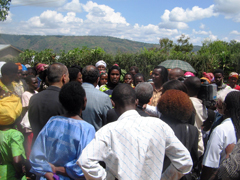
The meeting will bring together a broad cross-section
of AIDS implementers, including non-governmental
organizations receiving funding from various sources.
Faced with such a challenge, political leaders at the highest-level decided to adopt a multi-sectoral, multi-disciplinary, decentralized and community-based approach, involving representatives from groups of people living with HIV, faith based organizations, the media, the private sector and other stakeholders. In 2001, a National AIDS Control Commission was established under the office of the President and in 2002, a Treatment and Research AIDS Centre was created to expand access to testing and counselling, prevention of mother-to-child transmission and clinical care and support for people living with HIV.
Building on this tradition of collaborative work in the response to AIDS, the country is well on track for the meeting.
“I met with many governmental and non governmental groups working on AIDS in the country, and I am looking forward to working with them all in the coming months to fine tune the organization of this meeting,” said Mr Sidibe. “This meeting can become a significant milestone to better understand how we can make the money work for universal access and all parties are working hard to make this happen,” he concluded.
Links:
Listen to the interview with Michel Sidibe, UNAIDS’ Director of Country and Regional Support (mp3, 4Mb)
Visit the Implementers' Meeting website
More information on Rwanda
Related

Feature Story
UNAIDS’ Executive Director signs the Call to Stop TB
19 April 2007
19 April 2007 19 April 2007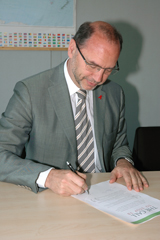
UNAIDS Executive Director, Dr
Peter Piot signing the 'Call to Stop
TB'
Executive Director of UNAIDS, Dr Peter Piot has joined the list of high-ranking officials and celebrities who have signed the ‘Call to Stop TB’. In signing the Call Dr Piot has emphasised UNAIDS’ commitment to tackling tuberculosis as one of the most important causes of illness and death amongst people living with HIV.
The ‘Call to Stop TB’ is an appeal to world leaders, governments, non-governmental organizations, civil society, the private sector and individuals to endorse, fully fund and implement the Global Plan to Stop TB 2006-2015, which aims to save 14 million lives and achieve the Millennium Development Goal targets for TB by 2015. Dr Piot signed the ‘Call’ after a round table discussion at the opening session of the Stop TB Partnership Coordinating Board meeting.
During the round table Dr Piot reiterated the threat that TB and especially drug-resistant TB pose to people living with HIV, but stated that the threat was also a key opportunity to develop closer collaboration between TB and HIV programmes and to deliver better and more comprehensive care to individuals and communities affected by both diseases.
Together with Margaret Chan, Director General of the World Health Organization, Jorge Sampaio, United Nations Secretary General’s Special Envoy to Stop TB and former president of Portugal, and Helen Evans and Michel Kazatchkine of the Global Fund to Fight AIDS, Tuberculosis and Malaria, they discussed with the Stop TB Coordinating Board members how to mobilize greater political commitment to tackling TB.
Links:
The Call to Stop TB
The Stop TB Partnership
The Global Plan to Stop TB (2006-2015)
Related
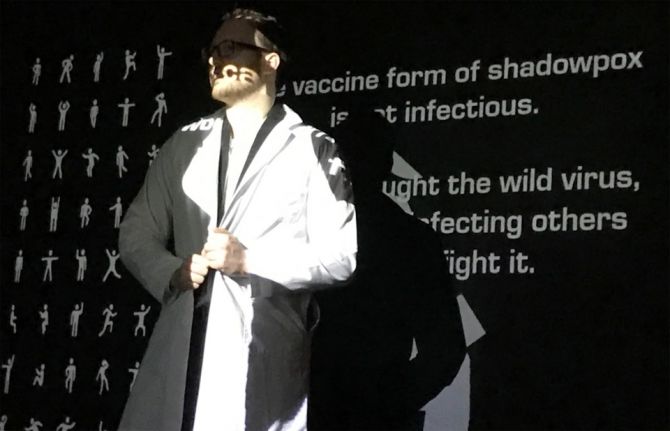 Immune Nations
Immune Nations

23 May 2017

Feature Story
FORO 2007 opens in Buenos Aires
18 April 2007
18 April 2007 18 April 2007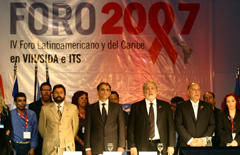
L-R: D. Fontana, Head of National Aids Programme
for Argentina; L. Loures, UNAIDS Headquarters; G.
González, Health Minister Argentina and P. Perez,
ICW Latin, during the opening of the FORO 2007.
Some 4,000 people are attending the IV Latin American and Caribbean Forum on HIV/AIDS and STD’s which opened in Buenos Aires on 17 April. Participants include people living with HIV, civil society groups, non-governmental and governmental institutions, academia, the media, UN agency representatives and the private sector.
Prior to the official opening ceremony UNAIDS held a satellite on universal access to HIV prevention, treatment, care and support where sessions included a review of progress in the region, challenges and ways forward in planning and costing, and sustainable financing for scaling up universal access.

Luiz Loures from UNAIDS Secretariat during his
intervention at the inaugural session of the FORO
2007.
Speaking from the conference, Luiz Loures, from UNAIDS Secretariat said, “Great work is being done in the region on scaling up towards universal access and we are seeing a real increase in commitment from leaders in all sectors of the AIDS response. But we urgently need to continue building on this action. The forum is giving us a platform to share ideas and put together new strategies to really move the AIDS response forward in Latin America and the Caribbean.”
Conference organisers outlined the main focus of the forum as being to:
- Contribute to and increase public awareness on the impact of the AIDS epidemic in the Latin American and Caribbean regions.
- Highlight recent successes, as well as outlining the challenges faced in the region and ways to overcome them.
- Contribute to increasing political commitment and accountability based on experience acquired in the region.
- Contribute to the reduction of AIDS-related stigma and discrimination.
- Strengthen capacity of those working in the field of AIDS.
- Promote the greater participation of all the social actors in response to the epidemic.

Ginés González, Health Minister of Argentina ,
during his speech at the launch of the FORO 2007
Nearly 2 million people are living with HIV in Latin America and the Caribbean where HIV transmission is occurring in the context of factors common to most of the region; widespread poverty and migration, insufficient information about epidemic trends outside major urban areas and rampant homophobia. Cesar Nunez, UNAIDS’ Regional Director for Latin America said, “One of the main aims of this conference is to discuss ways of reducing stigma and discrimination surrounding people living with HIV which is unfortunately still a major problem in the region.”
Expanding on the theme ‘Latin America and the Caribbean: United in diversity towards universal access’ , Andrés Leibovich, president of the organizing committee of Foro 2007 said, “The respect of diversity is the foundation of all democratic life. It is for that reason that in Latin America and the Caribbean we want to join together and build a society where inclusion and justice are real. This is why we are calling for universal access to education to help prevent new HIV infections, and for people living with HIV to be able to exercise their rights to access antiretroviral treatment and live with dignity.”
Links:
For more information please visit the official Forum website at http://www.forovihsida2007.org/

Feature Story
Treatment figures reach 2 million
17 April 2007
17 April 2007 17 April 2007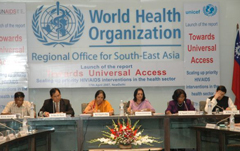
L to R: Mr K. K. Abraham, President, Indian Network
of People Living with HIV/AIDS, Dr Myo Zin Nyunt,
HIV/AIDS Specialist UNICEF Regional Office for
South Asia, Kathmandu, Ms K. Sujatha Rao
Additional Secretary & Director General, National
AIDS Control Organisation, New Delhi, Dr Poonam
Khetrapal Singh, Deputy Regional Director, WHO
Regional Office for South-East Asia, Dr Teguest
Guerma, Associate Director, HIV/AIDS Department,
WHO Headquarters, Geneva, Dr Denis Broun,
Country Coordinator, UNAIDS, New Delhi, during
the launch of the report in New Delhi
WHO, UNAIDS and UNICEF have launched a new report on scaling up priority AIDS interventions in the health sector. The report, launched in London, Geneva, New Delhi and Buenos Aires on 17 April, highlights that by the end of 2006 more than 2 million people in low- and middle-income countries had access to antiretroviral therapy. Representing a 54% increase over the 1.3 million people on treatment in 2005.
The report also gives an overview of global progress in a number of other priority health sector interventions areas, such as prevention of mother-to-child transmission, HIV testing and counselling, interventions for most-at-risk populations and the links between HIV and TB.
“The significant progress outlined in this report in scaling up access to treatment is a positive step forward for many countries in achieving their ambitious goals of universal access to HIV prevention, treatment, care and support,” said Dr Peter Piot, Executive Director of UNAIDS. “However new data in the report also shows that there is still a long way to go,” he added.
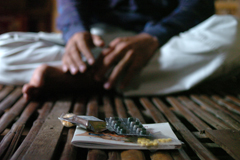
Countries in every region of the world are making
substantial progress in increasing access to HIV
treatment. Photo credit:UNAIDS/O.O'Hanlon
The report highlights a number of key areas in which efforts to scale-up services are insufficient including; the provision of antiretroviral treatment to prevent mother to child transmission of HIV (only 11% of HIV-positive pregnant women in need of treatment were receiving it in 2006); access to prevention and treatment services for people who inject drugs; and the need to scale-up testing and counselling services for people living with HIV (the report highlights that only 12% of men and 10% of women in sub-Saharan Africa know their HIV status).
The Director General of WHO, Dr Margaret Chan said, “We need ambitious national programmes, much greater global mobilization and increased accountability if we are going to succeed.”
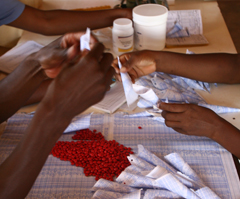
The report outlines the need to increase efforts to
accelerate the prevention, diagnosis and treatment
of HIV disease in children. Photo credit: UNAIDS/
A.Gutman
Among the recommendations outlined in the report was the need to increase efforts to accelerate the prevention, diagnosis and treatment of HIV disease in children. Although the number of children receiving treatment increased by 50% over the last year, still only 15% of those children in need of treatment had access to it.
“Children continue to be the missing face of the AIDS pandemic,” said Ann Veneman, Executive Director of UNICEF, “with too many children still missing out on life-saving treatment and access to other essential services.”
The report also gives progress on the target setting progress for universal access to prevention, treatment, care and support which UN member states committed to at the 2006 High Level Meeting on AIDS in New York. According to the report over 90 countries had set targets with 81 setting targets on treatment and 84 setting targets for at least one prevention intervention.
As a Cosponsor of UNAIDS, WHO has undertaken to monitor and evaluate the global health sector response in scaling up towards universal access and to produce annual reports. Towards universal access––scaling up priority HIV/AIDS interventions in the health sector is the first such report.
Links:
Read Press Release
Download full report (pdf 5,83 MB)
Download background document
Visit UNICEF Website
Related

Feature Story
Intensifying HIV prevention: country guidance critical
13 April 2007
13 April 2007 13 April 2007
Across the world, a small but growing number of countries have reduced HIV prevalence through sound prevention efforts. However, in 2006, there were still 4.3 million new HIV infections with over 40% of new adult infections occurring among young people aged 15-24. According to latest estimates, HIV prevention services reach only one in ten of people most at risk.
In an era where the world has committed to working towards universal access to HIV prevention, treatment, care and support by 2010, there is a clear and urgent need to intensify HIV prevention to halt growing infection rates and sustain the gains that have already been made in the AIDS response.
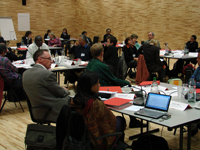
The UNAIDS HIV Prevention Reference
Group met in Geneva in April 2007
The call to expand high quality comprehensive HIV prevention programmes towards the goal of achieving universal access to prevention, treatment, care and support was stressed at the recent meeting of the UNAIDS HIV Prevention Reference Group, held in Geneva at the beginning of April.
Thirty-five HIV prevention experts, from national AIDS authorities, development partners, research institutions and civil society worldwide joined to discuss ways to better support efforts taking place at the country level to increase HIV prevention programmes in size and scale. Through the discussions, the meeting underlined that guidance for countries on the definitions, core components and quality standards for HIV prevention activities is critical to future action.
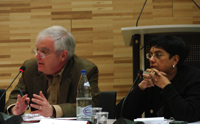
L-R: Professor Michael Merson, Director of
the Global Health Institute at Duke
University with Purnima Mane, UNAIDS
Director for Policy, Evidence and
Partnerships .
“Countries are under pressure to achieve ambitious prevention targets and thus require clear standards for high quality prevention activities,” said Professor Michael Merson, Director of the Global Health Institute at Duke University, who chaired the Reference Group meeting.
“National and sub-national AIDS programmes need to be able to make comparisons about what works and doesn’t work; and to estimate the resources required at country, regional, and global levels to provide universal access to HIV prevention services,” he added.
To assist countries in strengthening their national HIV prevention responses the participants recommended that UNAIDS work with experts in different areas of prevention to define key activities, specify their core components and develop a framework to monitor their quality.
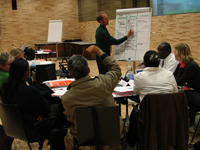
The two-day meeting included break-out
group work on key HIV prevention topics.
“Prevention activities have been delivered successfully and to high standards for years, and clarifying and disseminating min imum quality standards more broadly will assist countries in planning and costing realistic , scaled- up behavioural prevention programmes ,” said Purnima Mane, Director for Policy, Evidence and Partnerships at UNAIDS and co-Chair of the Prevention Reference Group. “ Small differences in definitions can make it difficult to compare the same HIV prevention activities, and to determine what works in different environments.”
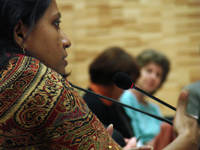
Participant Supriya Sahu, Project Director
of the Tamil nadu State AIDS Control
Society during her intervention at the
meeting.
The two-day meeting of the HIV Prevention Reference Group included presentations in plenary sessions by leading prevention experts on the challenges of defining prevention activities and their core components. A draft framework for assessing the quality of HIV prevention activities also was presented and discussed. Current practice often labels HIV prevention programmes according to single features, such as their target audience (e.g. “sex worker interventions”), objective (e.g. “empowerment interventions”), setting (e.g. “workplace interventions”) and type of activity (e.g. “mass media”), whereas participants underlined the needed nomenclature should recognize that all these features are important parts of the definition and quality standards of any programme . During interactive discussions in plenary and small groups it was emphasized that comprehensive HIV prevention programmes comprise bundles of different activities, each of which can be defined to include a set of critical elements and quality standards for planning and implementation.
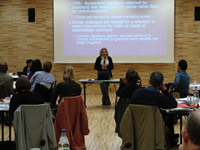
The two-day meeting of the HIV Prevention
Reference Group included presentations in
plenary sessions by leading prevention
experts on the challenges of defining
prevention activities and their core
components
The meeting of the UNAIDS HIV Prevention Reference Group forms part of the ongoing efforts of UNAIDS to support countries to strengthen their national responses to the epidemic. In 2005 UNAIDS published the UNAIDS Policy Position Paper for Intensifying HIV Prevention that outlined the key principles and policy actions for HIV prevention. UNAIDS recently published the UNAIDS Practical Guidelines for Intensifying HIV Prevention which provides countries with practical guidance on the activities that should be undertaken in different epidemic settings to strengthen their national HIV prevention responses within the ambit of Universal Access. The Reference Group meeting initiated a process to define and outline the quality standards and costs for the recommended set of HIV prevention activities outlined in the Practical Guidelines.

UNAIDS Executive Director Dr
Peter Piot attended the last day
of the meeting.
The UNAIDS HIV Prevention Reference Group was established by the Executive Director in 2004 as a forum that brings together leading prevention experts to advise UNAIDS on approaches to strengthen and sustain HIV prevention interventions at the country and regional level. Recognizing that there are many facets to HIV prevention , each meeting of the Reference Group draws upon national AIDS authorities, civil society and scientists based upon their knowledge, expertise and experience in addressing the subject of the meeting.
All photo credits: UNAIDS/S. Imbers
Intensifying HIV prevention: country guidance cri
UNAIDS HIV Prevention Reference Group Meeting:
Agenda (pdf, 49Kb)
List of participants (pdf, 52Kb)
Related Presentations:
Proposed framework - developing a common terminology and indicators (pdf, 52Kb)
A framework for planning and evaluating behavior intervention (pdf, 112Kb)
Defining behavioral interventions (pdf, 451Kb)
Feedback session: defining behavioural interventions (pdf, 88Kb)
Why develop a taxonomy of HIV behavioural intervention activities? (pdf, 125Kb)
Related Documents:
UNAIDS Policy Position Paper for Intensifying HIV Prevention(pdf, 3,8Mb)
UNAIDS Practical Guidelines for Intensifying HIV Prevention(pdf, 1,67Mb)
Audio Interviews:

Peter Mwarogo
Country Director
Family Health International
Listen (mp3 1,25 Mb)

Anuar Luna
Red Mexicana de Personas que Viven con VIH
Listen (mp3 670 Kb)

Michael Sweat
Associate Professor
John Hopkins Bloomberg School of Public Health
Listen (mp3 652 Kb)

Michaela Clayton
Director
AIDS and Rights Alliance for Southern Africa (ARASA)
Listen (mp3 647 Kb)



